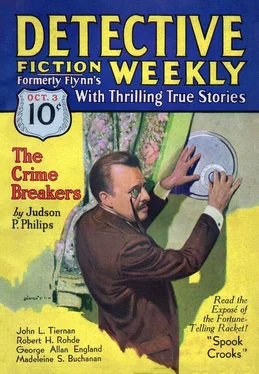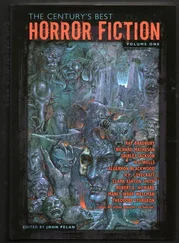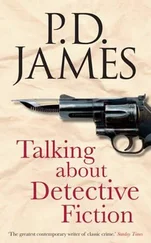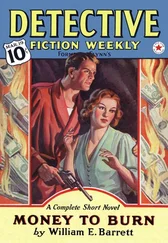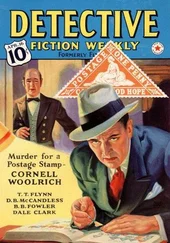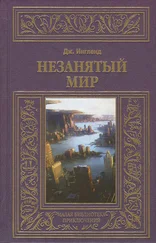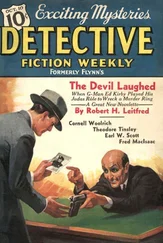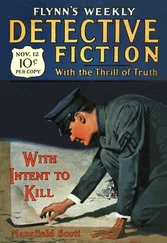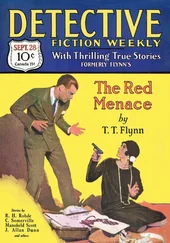Джордж Энгланд - Detective Fiction Weekly. Vol. 62, No. 2, October 3, 1931
Здесь есть возможность читать онлайн «Джордж Энгланд - Detective Fiction Weekly. Vol. 62, No. 2, October 3, 1931» весь текст электронной книги совершенно бесплатно (целиком полную версию без сокращений). В некоторых случаях можно слушать аудио, скачать через торрент в формате fb2 и присутствует краткое содержание. Город: New York, Год выпуска: 1931, Издательство: The Red Star News Company, Жанр: Детектив, на английском языке. Описание произведения, (предисловие) а так же отзывы посетителей доступны на портале библиотеки ЛибКат.
- Название:Detective Fiction Weekly. Vol. 62, No. 2, October 3, 1931
- Автор:
- Издательство:The Red Star News Company
- Жанр:
- Год:1931
- Город:New York
- ISBN:нет данных
- Рейтинг книги:3 / 5. Голосов: 1
-
Избранное:Добавить в избранное
- Отзывы:
-
Ваша оценка:
- 60
- 1
- 2
- 3
- 4
- 5
Detective Fiction Weekly. Vol. 62, No. 2, October 3, 1931: краткое содержание, описание и аннотация
Предлагаем к чтению аннотацию, описание, краткое содержание или предисловие (зависит от того, что написал сам автор книги «Detective Fiction Weekly. Vol. 62, No. 2, October 3, 1931»). Если вы не нашли необходимую информацию о книге — напишите в комментариях, мы постараемся отыскать её.
Detective Fiction Weekly. Vol. 62, No. 2, October 3, 1931 — читать онлайн бесплатно полную книгу (весь текст) целиком
Ниже представлен текст книги, разбитый по страницам. Система сохранения места последней прочитанной страницы, позволяет с удобством читать онлайн бесплатно книгу «Detective Fiction Weekly. Vol. 62, No. 2, October 3, 1931», без необходимости каждый раз заново искать на чём Вы остановились. Поставьте закладку, и сможете в любой момент перейти на страницу, на которой закончили чтение.
Интервал:
Закладка:
“Here’s a fifty-dollar bill,” he said to the driver. “You go somewhere else and forget all about what you’ve seen to-night.”
The driver grinned broadly. “O. K., chief!”
Jim slipped across the pavement and into the shadow of the buildings, for he realized that he was decidedly conspicuous in his dinner clothes without either hat or coat. Cronin was walking along in front of him, unconcernedly, his hands stuffed into his trousers pockets, a cigarette dangling between his lips. This side street was deserted, for it was after midnight and they were well away from the theater district.
Jim quickened his pace and drew closer to the gunman. He must act quickly if he was to get the necklace. He remembered that Hewes had told him Cronin was one of the quickest men with a gun in the city and Jim’s hand closed over the butt of the pistol in his own pocket. He was only ten yards back of Cronin when the gunman turned into an alley between two buildings. Jim’s muscles tightened. Had Cronin guessed that he was being followed or was he taking a short cut? If it was the former reason, Jim knew that the minute he turned into the alley he would in all probability breathe his last. But there was no choice. The success of the whole venture hinged on his getting the necklace from Cronin before he reached a place of safety. Jim drew his gun and turned into the alley.
He had steeled himself for an attack, but it did not come. Instead he saw Cronin far down the alley, still walking unconcernedly, the red point of his cigarette showing in the darkness. Jim crouched and ran noiselessly after him. Now was the time.
Cronin did not hear his pursuer until Jim was almost on top of him. Then he turned, snarling, his hand going like lightning for the gun under his right arm-pit. Jim wanted no gun shots if he could avoid it. He did not dare have attention attracted to him until he had delivered the necklace to Martin Hewes. He sent himself hurtling through the air in a magnificent flying tackle that crushed the little gunman under its ferocity before he could draw the gun from its holster.
But that was not the end. Jim was bigger and heavier than Cronin, but the wiry little gunman fought with a maniacal fury that more than evened things. There was very little noise. Each man was fighting for his life and Cronin, writhing and twisting, was trying to get a free hand at his gun. In the darkness there was no opportunity to aim a decisive blow and Jim was slugging blindly at the smaller man, hoping by the grace of Providence that he could keep Cronin from his weapon. In the narrow confines of the alley there was little room for movement, and Jim was bruised and gasping for breath as they repeatedly crashed against the brick walls of the overhanging buildings.
When the fight ended, it was so sudden that Jim found himself leaning against one of the walls, dazed. They had half struggled to their feet and with a desperate lurch Cronin freed himself from Jim’s grasp. Jim knew it was his finish unless the fates were with him. He struck out in the blackness with every last ounce of strength in his weary arm... and the blow-landed. Cronin was catapulted backward and his head struck with a sickening thud against the bricks. He crumpled down to the pavement and lay still.
Jim, sucking in his breath in agonized gulps, knelt down and felt for his victim. The year in prison had left him out of condition and he felt weak and dizzy. His first move was to take the gun from Cronin’s holster and slip it into his own pocket. Then in a side pocket he found the plush box which contained the diamonds. He rose slowly to his feet. Once that box was in Martin Hewes’s hands he would have struck the first blow at Sheringham.
He walked unsteadily down the alley to the street and hailed a cab.
Chapter XI
Caught!
Inspector Ives was not a genius, but when it came to applying the resources of the police department to his ends he was unbeatable. In matters of routine detection he never missed a trick. Thus, when he learned that Jim Garth, ex-convict, had been among those present when the lights went out and that he was now missing, he made immediate steps in the direction of locating this man.
Garth’s little scene with the warden in which he had rather unwisely said that the only thing he had left to live for was to square himself with the man who had betrayed him had led that official to notify the police that it might be worth their while to keep an eye on the former society man. This had been done in a stolid, matter-of-fact way, and so when Ives got in touch with headquarters he learned that Jim was living with Martin Hewes, the private detective.
Ives repaired at once to Hewes’s home with several plain-clothes men, only to find there was no one at home. At least their repeated ringing of the door bell brought no response and there were no lights visible anywhere in the house. He was a little at a loss to know how to interpret the fact of Garth’s residence with Hewes. To the best of his knowledge Hewes was a law abiding citizen, and it was a little incredible to the inspector that he would harbor a thief, if for no other reason than it would have a damaging effect on his reputation as a detective. But Ives was not one to go off half-cocked, and he settled down stolidly with his men to wait for Hewes or Garth to show up.
Meanwhile Jim Garth, ragged and disheveled from his encounter with Cronin, had emerged from the alley and engaged a taxi to bring him home. He sat back in the cab trying to get back some of the strength that had been sapped in his exhausting struggle. When the cab drew up before Hewes’s house he got out, paid his fare, and turned toward the steps. It was only then that he saw Ives and his men waiting. He stopped abruptly, every nerve tense.
A dozen thoughts flashed through his mind. If Ives were to arrest him now the consequences would be grave indeed, for not only was the necklace in his possession, a fact that would be hard to explain away, but also he was carrying two guns in direct violation of the Sullivan Act, and as an ex-convict he would be liable to a severe sentence. Whatever happened he must not fall into Ives’s hands at the moment.
In a very leisurely manner he turned and began to stroll along the sidewalk away from the house. The inspector and his men hesitated for a moment, wondering if after all this was not their man. Then as Jim passed a street lamp and the disheveled condition of his clothing became apparent to them, Ives called out.
“Garth! Wait!”
The inspector’s staccato hail only made Jim take to his heels like a scared rabbit. Some one fired a shot after him but it went wild and he ducked into an alley between two houses and sprinted for safety. He could hear the policemen shouting to each other and he guessed some of them had been dispatched around the block to meet him when he emerged from the other end of the alley. He hesitated for just a minute, panting for breath. He was in a maze of back yards, walled in by low wooden fences, and he scaled one of these walls and dropped into the yard beyond. Ives and two of his men were clattering down the alley.
Jim’s first move was to get rid of the two guns he was carrying. He might be able to explain away the necklace with Hewes’s assistance, but never the guns. He stumbled across the yard, littered with trash, to the next fence and pulled himself up. A shout rose behind him and the top of the fence a foot from him was splintered by a bullet. One of the detectives had mounted the wall behind to have a look around and had spotted him.
Jim literally fell over the wall into the next yard and then paused to take stock of the situation. It would be too hazardous to climb again, for they would be waiting, and his chances of escaping another bullet would be unpleasantly slim. The dim light from an upper window gave him a faint glimpse of his surroundings. He was in the back yard of a rather modern apartment building, and just to the right of it was a service passage leading to the street. This must be his avenue of escape and he started on the run down it. At the exit to the street he paused and looked cautiously out, only to withdraw hurriedly. Two of Ives’s men were patrolling the sidewalk. Behind him he could hear the shouts of the rest of the party. He was trapped.
Читать дальшеИнтервал:
Закладка:
Похожие книги на «Detective Fiction Weekly. Vol. 62, No. 2, October 3, 1931»
Представляем Вашему вниманию похожие книги на «Detective Fiction Weekly. Vol. 62, No. 2, October 3, 1931» списком для выбора. Мы отобрали схожую по названию и смыслу литературу в надежде предоставить читателям больше вариантов отыскать новые, интересные, ещё непрочитанные произведения.
Обсуждение, отзывы о книге «Detective Fiction Weekly. Vol. 62, No. 2, October 3, 1931» и просто собственные мнения читателей. Оставьте ваши комментарии, напишите, что Вы думаете о произведении, его смысле или главных героях. Укажите что конкретно понравилось, а что нет, и почему Вы так считаете.
